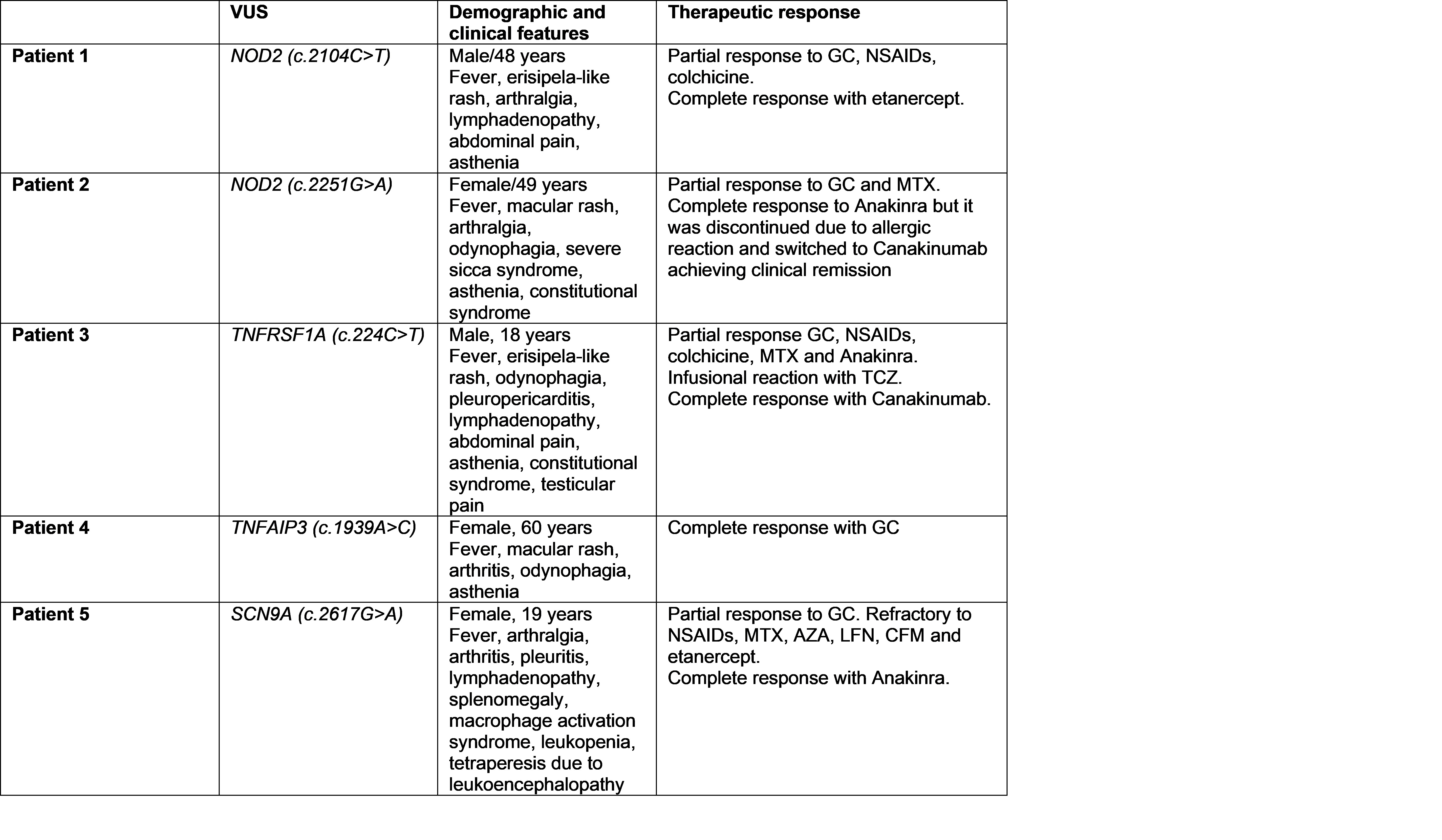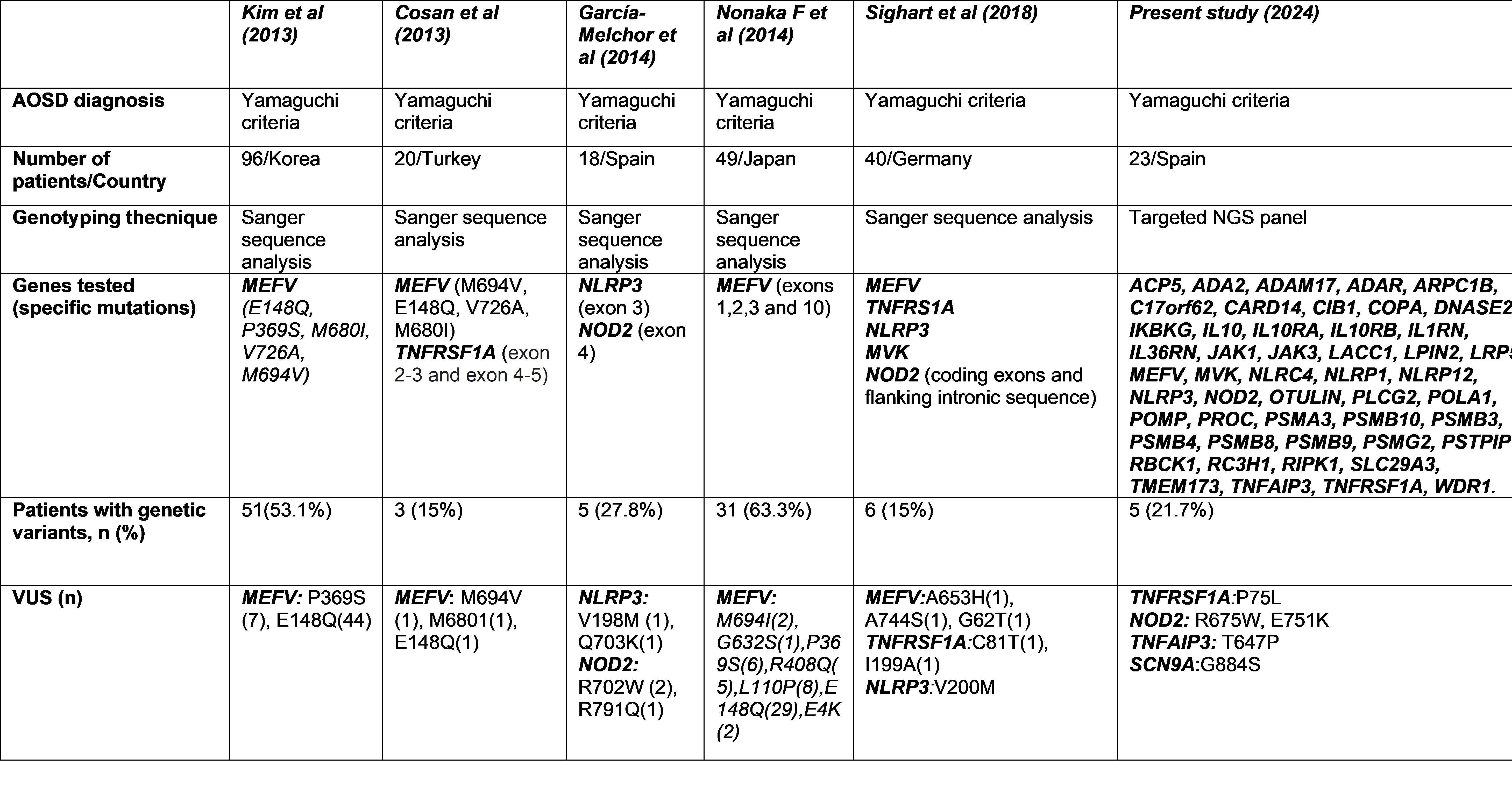Session Information
Session Type: Poster Session B
Session Time: 10:30AM-12:30PM
Background/Purpose: Molecular genetic techniques are becoming increasingly essential tools for the diagnosis of monogenic systemic autoinflammatory diseases (SAIDs). However, their role in the diagnosis of AOSD remains limited. Previous studies assessing potential genetic variants in AOSD have only assessed single coding regions of a few genes using Sanger sequencing. However, NGS panels are becoming the genetic technique of choice because they allow rapid and simultaneous analysis of complete coding sequence of several SAID-related genes. The aim of our study was to assess the usefulness of NGS panels in AOSD patients to improve diagnosis and management of the disease.
Methods: Observational, multicenter study of all patients with AOSD diagnosis in whom NGS panel was performed in Northern Spain. Clinical manifestations, laboratory parameters, complications and therapeutic response was recorded.
Results: 23 patients (15 men, 8 women) with a mean age of 42.0±18.1 years, in whom NGS was performed, fulfilled Yamaguchi criteria for AOSD. Most common manifestations, apart from fever, were skin rash (73.9%), asthenia (95.7%) and articular manifestations (91.3%). All patients had elevated acute-phase reactants levels and hyperferritinemia. Almost all patients received oral glucocorticoids as initial therapy. Conventional disease modifying anti-rheumatic drugs (cDMARDs) were used in 17 (73.9%) patients and biologic therapy in 12 (52.2%) patients. Genetic variants were observed in 5 (21.7%) patients. None of them were classified as pathogenic. Variants of uncertain significance (VUS) were identified in: NOD2 (c.2104C >T and c.2251G >A), TNFRSF1A (c.224C >T), TNFAIP3 (c.1939A >C) and SCN9A (c.2617G >A). Atypical manifestations and/or therapeutic refractoriness were observed in patients carrying genetic variants, except from the patient with the TNFAIP3 VUS (Table 1). Table 2 summarizes previous reported data of genetic studies in AOSD patients. The prevalence of VUS varies widely across populations. Our results are in line with those reported in Caucasian population ranging from 15% to 27.8%. However, Asian studies found a higher frequency of VUS in MEFV. It is worth mentioning that none of our patients carried VUS in MEFV.
Conclusion: To the best of our knowledge, our study is the first to assess the role of NGS panel in AOSD patients. NGS was useful to rule out the presence of pathogenic genetic variants related to other SAIDs and to detect VUS that may help to identify patients at risk for atypical and severe manifestations and poor response to conventional therapy.
To cite this abstract in AMA style:
Atienza-Mateo B, Prieto-Peña D, Labrador-Sánchez E, Palmou Fontana N, Melero-Gonzalez R, Anton Pages F, Alvarez Reguera C, Paz-Gandiaga N, Blanco-Alonso R. Next-Generation Sequencing in Molecular Genetics of Adult-Onset Still’s Disease: Data from 23 Patients and Literature Review [abstract]. Arthritis Rheumatol. 2024; 76 (suppl 9). https://acrabstracts.org/abstract/next-generation-sequencing-in-molecular-genetics-of-adult-onset-stills-disease-data-from-23-patients-and-literature-review/. Accessed .« Back to ACR Convergence 2024
ACR Meeting Abstracts - https://acrabstracts.org/abstract/next-generation-sequencing-in-molecular-genetics-of-adult-onset-stills-disease-data-from-23-patients-and-literature-review/


